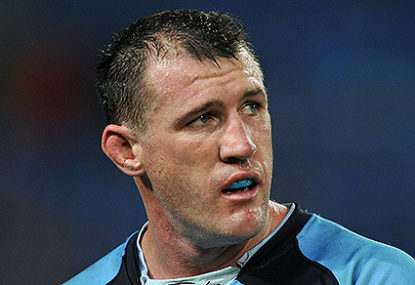Ricky just about shatters the glass celebrating match-winner as Manly literally throw away last chance
The Raiders came back from a 20-6 half-time deficit, leading to polar opposite reactions in the coaches' box.

It’s almost Origin time. And once again Queensland are favoured to win the series.
But at some point early in the series, just like every year, Phil Gould and a host of other Blues boosters will regale us with tales of how Queensland’s run of victories is about to end.
One year, maybe even this year, they will be proven right. Will that mean that finally they have correctly assessed the merits of the two teams? That they have derived a complicated algorithm that calculates the ‘better’ team, whatever that means in football?
No, it will be for the same reason that there have been so many false dawns over the last eight years. The same reason that fools persist in believing that the series is 1-1 after two games by design – “to keep the interest up.” And that reason is randomness and the difficulties we have in understanding it.
We like to believe that we are hard-headed logical thinkers, carefully weighing the facts and figures to come to our conclusions. In truth, we are driven more by supposition, hunch, superficial appearance and guesswork. For instance, we would like to believe that the better team wins each Origin series and sometimes it does. But not always. A three-game series simply isn’t long enough to ensure that.
Let’s have a look at why this is. For the sake of the discussion I will ignore the home ground advantages and consider them even.
We can all see that there is a 50 per cent chance of either team winning the series. There is also a 50 per cent chance the series will end 1-1 if both sides win each of the first two games. However, it seems to punters that if one team is better than the other that these odds should shift dramatically. But this isn’t so.
Over the last eight series NSW have won seven of the 24 games. Let’s be kind and take one off Queensland and give it to NSW. So Queensland lead 16-8. So for our purposes Queensland will win 2/3 of games between the two sides. There are only eight possible outcomes for the series, and the chances of each combination occurring are:
QQQ = 2/3 X 2/3 X 2/3 = 8/27 = 29.6%
QQN = 2/3 X 2/3 X 1/3 = 4/27 = 14.8%
QNQ = 2/3 X 1/3 X 2/3 = 4/27 = 14.8%
QNN = 2/3 X 1/3 X 1/3 = 2/27 = 7.4%
NNN = 1/3 X 1/3 X 1/3 = 1/27 = 3.7%
NNQ = 1/3 X 1/3 X 2/3 = 2/27 = 7.4%
NQN = 1/3 X 2/3 X 1/3 = 2/27 = 7.4%
NQQ = 1/3 X 2/3 X 2/3 = 4/27 = 14.8%
So even if Queensland is twice as likely to win any given game, NSW would still win better than one in four series. After two games the series would be 1-1 44 per cent of the time.
Leonard Mlodinow, in his excellent book The Drunkard’s Walk: How Randomness Rules Our Lives, says about the MLB World Series:
“In the lopsided 2/3-probability case, for example, you’d have to play a series consisting of at minimum the best of 23 games to determine the winner with what is called statistical significance, meaning the weaker team would be crowned champion 5 per cent or less of the time.”
So, if the Blues win this year it’s not that they have the better team. It’s because of randomness. And if they lose it’s not the fault of the selectors – it’s randomness.
And maybe just a little bit of footy.